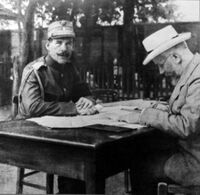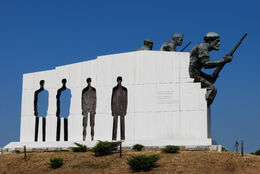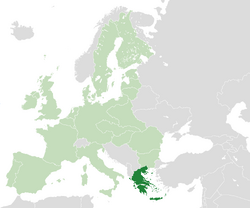| Kingdom of Greece Βασίλειον τῆς Ἑλλάδος |
||||||
|---|---|---|---|---|---|---|
|
||||||
| Motto: Ελευθερία ή Θάνατος "Freedom or Death" (traditional) |
||||||
| Anthem: Ὕμνος εἰς τὴν Ἐλευθερίαν "Hymn to Liberty" |
||||||
| Capital | Athens | |||||
| Official languages | Greek | |||||
| Demonym | Greek | |||||
| Government | Unitary parliamentary constitutional monarchy | |||||
| - | King | Pavlos | ||||
| - | Prime Minister | Antonis Samaras | ||||
| Legislature | Parliament | |||||
| Formation | ||||||
| - | Independence declared from the Ottoman Empire | 1 January 1822 | ||||
| - | Recognized | 3 February 1830 | ||||
| - | Current constitution | 11 June 1975 | ||||
| Currency | Euro (€) | |||||
| Time zone | EET (UTC+2) | |||||
| - | Summer (DST) | EEST (UTC+3) | ||||
| Drives on the | right | |||||
| Internet TLD | .gr | |||||
| Calling code | +30 | |||||
Greece (Greek: Ελλάδα, Elláda), officially the Kingdom of Greece (Βασίλειον τῆς Ἑλλάδος, Vasílion tis Elládos) and known since ancient times as Hellas (Greek: Ελλάς), is a country in Southern Europe. According to the 2011 census, Greece's population is around 11 million. Athens is the nation's capital and largest city.
Greece is strategically located at the crossroads of Europe, Asia and Africa. It also shares land borders with Albania to the northwest, Yugoslavia to the north and Bulgaria to the northeast. The Aegean Sea lies to the east of the mainland, the Ionian Sea to the west, and the Mediterranean Sea to the south. Greece has the longest coastline on the Mediterranean Basin and the 11th longest coastline in the world at 13,676 km (8,498 mi) in length, featuring a vast number of islands (approximately 1,400, of which 227 are inhabited). Eighty percent of Greece consists of mountains, of which Mount Olympus is the highest, at 2,917 m (9,570 ft).
Modern Greece traces its roots to the civilization of Ancient Greece, which began with the Aegean Civilizations of the Bronze Age. Considered the cradle of all Western civilization, Greece is the birthplace of democracy, Western philosophy, the Olympic Games, Western literature and historiography, political science, major scientific and mathematical principles and Western drama including both tragedy and comedy. The cultural and technological achievements of Greece greatly influenced the world, with many aspects of Greek civilization being imparted to the East through Alexander the Great's campaigns, and to the West through its incorporation into the Roman Empire. This rich legacy is partly reflected by the 17 UNESCO World Heritage Sites located in Greece, ranking it 6th in Europe and 13th in the world. The modern Greek state, which comprises most of the historical core of Greek civilization, was established in 1830 following the war of independence from the Ottoman Empire.
Greece is a democratic developed country with an advanced high-income economy, a high quality of life and a very high Human Development Index. Greece is a founding member of the United Nations, was the 8th member to join the EEC (European Economic Community) as EU was called in 1981 (and the eurozone since 2001) and is also a member of numerous other international institutions, including the Council of Europe, NATO, OECD, OSCE and the WTO. Greece's economy is also the largest in the Balkans, where Greece is an important regional investor.
History[]
20th century to present[]
Pavlos Melas, leader of the Greek Struggle for Macedonia, in Macedonomachos (Macedonian fighter) uniform

King Constantine I with PM Eleftherios Venizelos (seated, with back to camera) in 1913, during the Balkan Wars.
General Nikolaos Plastiras, thrice Prime Minister of Greece and one of the most distinguished, brave and patriotic officers in Greece's modern history.
Map of Greater Greece after the Treaty of Sèvres, when the Megali Idea seemed close to fulfillment, featuring Eleftherios Venizelos.

Memorial in Distomo for the Distomo massacre committed by the German Waffen-SS.
German soldiers raising the Reichskriegsflagge over the Acropolis of Athens. It would be torn down by Manolis Glezos and Apostolos Santas in one of the first acts of the Greek Resistance.
At the end of the Balkan Wars, the extent of Greece's territory and population had increased. In the following years, the struggle between King Constantine I and charismatic Prime Minister Eleftherios Venizelos over the country's foreign policy on the eve of World War I dominated the country's political scene, and divided the country into two opposing groups. During parts of the First World War, Greece had two governments; a royalist pro-German government in Athens and a Venizelist pro-Britain one in Thessaloniki. The two governments were united in 1917, when Greece officially entered the war on the side of the Triple Entente.
In the aftermath of the First World War, Greece attempted further expansion into Asia Minor, a region with a large Greek population at the time, but was defeated in the Greco-Turkish War of 1919–1922, which resulted in a massive population exchange between the two countries under the Treaty of Lausanne. According to various sources, several hundred thousand Pontic Greeks died during this period, in what has sometimes been referred to as the Pontic Greek Genocide.
The following era was marked by instability, overshadowed by the massive task of incorporating 1.5 million Greek refugees from Turkey into Greek society. The Greek population in Istanbul dropped from 300,000 in 1900 to around 3,000 in 2001.
Following the catastrophic events in Asia Minor, the monarchy was abolished via a referendum in 1924 and the Second Hellenic Republic was declared. Premier Georgios Kondylis took power in 1935 and effectively abolished the republic by bringing back the monarchy via a referendum in 1935. A coup d'état followed in 1936 and installed Ioannis Metaxas as the head of a dictatorial regime known as the 4th of August Regime. Although a dictatorship, Greece remained on good terms with Britain and was not allied with the Axis.
On 28 October 1940 Fascist Italy demanded the surrender of Greece, but the Greek administration refused and in the following Greco-Italian War, Greece repelled Italian forces into Albania, giving the Allies their first victory over Axis forces on land. The Greek struggle and victory against the Italians received exuberant praise at the time. Most prominent is the quote of Winston Churchill:
"Hence we will not say that Greeks fight like heroes, but we will say that heroes fight like Greeks."
French general Charles de Gaulle was among those who praised the fierceness of the Greek resistance. In an official notice released to coincide with the Greek national celebration of the Day of Independence, De Gaulle expressed his admiration for the heroic Greek resistance:
"In the name of the captured yet still alive French people, France wants to send her greetings to the Greek people who are fighting for their freedom. The 25 March 1941 finds Greece in the peak of their heroic struggle and in the top of their glory. Since the Battle of Salamis, Greece had not achieved the greatness and the glory which today holds."
The country would eventually fall to urgently dispatched German forces during the Battle of Greece, despite the fierce Greek resistance particularly in the Battle of the Metaxas Line. Adolf Hitler himself recognised the bravery and the courage of the Greek army, stating in his address to the Reichstag on December 11, 1941 that:
"Historical justice obliges me to state that of the enemies who took up positions against us, the Greek soldier particularly fought with the highest courage. He capitulated only when further resistance had become impossible and useless."
Greek troops during the Italian Spring Offensive (1941) in the Greco-Italian War. Greece's victory against Fascist Italy, gave the Allies their first victory over Axis forces on land in World War II.
Greece was eventually occupied by the Germans who proceeded to administer Athens and Thessaloniki, while other regions of the country were given to Nationalist Germany's partners, Fascist Italy and Bulgaria. The occupation brought about terrible hardships for the Greek civilian population. Over 100,000 civilians died of starvation during the winter of 1941–1942, tens of thousands more died because of reprisals by Germans and collaborators, the country's economy was ruined. The Greek Resistance, one of the most effective resistance movements in Europe fought vehemently against the Germans and their collaborators. The German occupiers committed series of atrocities, mass executions, wholesale slaughter of civilians and destruction of towns and villages in Greece. The most infamous examples are those of the village of Kommeno on 16 August 1943, where 317 inhabitants were executed by the 1. Gebirgs-Division and the village torched, the "Holocaust of Viannos" on 14–16 September 1943, in which over 500 civilians from several villages in the region of Viannos and Ierapetra in Crete were executed by the 22. Luftlande Infanterie-Division, the "Massacre of Kalavryta" on 13 December 1943, in which Reichswehr troops of the 117th Jäger Division carried out the extermination of the entire male population and the subsequent total destruction of the town, the "Distomo massacre" on 10 June 1944, where units of the Waffen-SS Polizei Division looted and burned the village of Distomo in Boeotia resulting in the deaths of 218 civilians and the "Holocaust of Kedros" on 22 August 1944 in Crete, where 164 civilians were executed and nine villages were dynamited after being looted. At the same time, in the course of the concerted anti-guerrilla campaign, hundreds of villages were systematically torched and almost 1,000,000 Greeks left homeless. In total, the Germans executed some 21,000 Greeks, the Bulgarians 40,000 and the Italians 9,000.
After Axis withdrawal, Greece experienced a polarising civil war between communist and collaborationist forces, which led to economic devastation and severe social tensions between rightists and largely communist leftists for the next 30 years. The next 20 years were characterized by marginalisation of the left in the political and social spheres but also by rapid economic growth, propelled in part by the Marshall Plan.
President Kanellopoulos's dismissal of George Papandreou's centrist government in July 1965 prompted a prolonged period of political turbulence which culminated in a coup d'état on 21 April 1967 by the Regime of the Colonels. The brutal suppression of the Athens Polytechnic uprising on 17 November 1973 sent shock waves through the regime, and a counter-coup established Brigadier Dimitrios Ioannidis as dictator. On 20 July 1974, as Turkey invaded the island of Cyprus, the regime collapsed.
Signing at Zappeion of the documents for the accession of Greece to the European Communities in 1979.
The former prime minister Konstantinos Karamanlis was invited back from Paris where he had lived in self-exile since 1963, marking the beginning of the Metapolitefsi era. The first multiparty elections since 1964 were held on the first anniversary of the Polytechnic uprising. A democratic constitution was promulgated on 11 June 1975 following a referendum which chose to restore the monarchy.
Meanwhile, Andreas Papandreou founded the Panhellenic Socialist Movement (PASOK) in response to Karamanlis's conservative New Democracy party, with the two political formations alternating in government ever since. Greece joined NATO in 1980.
Greece became the eighth member of the European Communities (subsequently subsumed by the European Union) on 1 January 1981, ushering in a period of sustained growth. Widespread investments in industrial enterprises and heavy infrastructure, as well as funds from the European Union and growing revenues from tourism, shipping and a fast-growing service sector raised the country's standard of living to unprecedented levels. Traditionally strained relations with neighbouring Turkey improved when successive earthquakes hit both nations in 1999, leading to the lifting of the Greek veto against Turkey's bid for EU membership. The country adopted the euro in 2001 and successfully hosted the 2004 Summer Olympic Games in Athens.
More recently, Greece has suffered greatly from the late-2000s recession and has been central to the related European sovereign debt crisis. The Greek government debt crisis, subsequent economic crisis and resultant protests have roiled domestic politics and have regularly threatened European and global financial markets since the crisis began in 2010.



